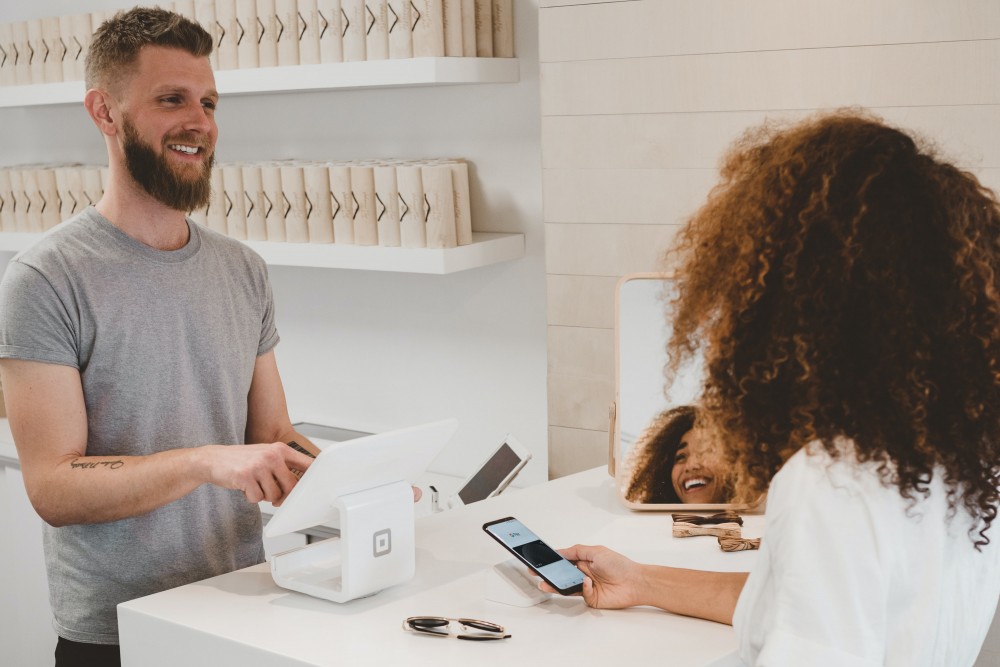Customers versus Clients
January 23rd, 2023
For many people, the two words customers and clients are interchangeable but that is hardly the case. Customers engage in a transactional relationship with a business entity while a client is under the care and protection of that business. Confused? Don’t be, the distinction is very easy to explain. For example, you are traveling by car in an area that you are not familiar with, and you need to buy gas. You see a station, pull over, pop your credit card into the pump, and fill your tank. Perhaps while you are there you realize that a snack and a drink are also needed. Inside the store you go, grab the desired items, pay at the register, hop back in the car, and you are back on your way. There is no long-term relationship being formed. If you even noticed the name of the clerk or the station it will probably be erased from memory by the end of the day. That is a transactional relationship or customer interaction. No long-term expectations, no commitment, it was simply a business in the right place at the right time for what you needed. If any of you have ever watched the show Cheers the theme song says, “You want to go where everybody knows your name.” When the regulars enter the bar, they are greeted by name, and the server probably knows exactly what they want to drink. That is something that most of us can relate to. Whether it is a bar, restaurant, or a shop you frequent there is a different feel when you are greeted by name or recognized by the person helping you. You tend to patronize establishments where you feel more like family or a valued client than just simply providing funds to that business.
Organizations that do it right tend to be around for a long time with a very loyal and repeat base of clients. These businesses or associations let people know their clients, not customers, are important to them. That car mechanic that will ask before you leave your car whether you have a ride home, or that server that has your favorite beverage by your elbow almost as soon as you sit down. You are significant to them, and they want you to know it.
Just recently, Southwest Airlines gave us some textbook tips on what not to do and how not to keep your fan base loyal. Right around Christmas, the country experienced terrible weather, there is no denying that. Flights were cancelled coast to coast and passengers were stranded in airports, at home, and where they had travelled to. No other airline seemed to handle it as poorly as Southwest. Initially, they blamed the weather, and rightfully so, but after the storms were over, other airlines were cancelling 20% of their flights or less. Southwest was at around 60%, in Boston that number was over 80%. It took the airline way too long to apologize to the stranded passengers and even longer to try and fix the problem. Never did they truly accept responsibility as an organization. After blaming the weather, they then claimed that they had help shortages. Angry ground and flight crews took to social media and news outlets to let people know they were ready to work, and showed up for shifts, only to find that there were no planes for them to service or fly.
News started to leak out that there were significant operational problems within the airline. Apparently, Southwest schedules flights and equipment the way that many airlines did years ago but found that there were better, more efficient ways to move their customers, equipment, and staff from destination to destination. More than a few customers were quoted saying they wouldn’t be rushing back to Southwest anytime soon, and some were long time Southwest devotees. To add insult to injury, this past week Southwest sent out their weekly sale email. There was no apology, not even an acknowledgement that they had significant problems just a week or 2 earlier. Here was a wonderful opportunity to stand up, admit their failures, offer some great fares, and ask people to give them another chance. Nope, it was business as usual. We call that being truly tone deaf.
For years, I had a love-love relationship with Apple. Both their products and service were fantastic. Long before they had stores with waiting lines, years before anyone had heard of an iPhone or an iWatch, I was a loyal customer. My first MAC looked like a 1950’s TV set with a bright blue back. For whatever reason, their products designs, and workflows made sense to me. There are still things today that I love about the company. Unlike Microsoft products, when a new operating system is available, you simply download and install it. Apple has changed since we first got together, and it is definitely them and not me. People forget that years ago Apple struggled to get a foothold in the market. They appealed to a very niche market and had not developed many of the products they offer today. Legend has it that Steve Jobs was obsessed with how the end user would interface with the product. Early on, MAC’s were very intuitive and user friendly. Even as the company morphed into the behemoth they are today, the customer experience was paramount to them. If you had a problem with one of their products often all you had to do was bring it to one of their stores and an in-house technician could diagnose it and usually fix it. Down time was frequently less than 24 hours. Long before the help shortage hit, Apple had started changing their business model and not for the better. Repairs are now done at centralized locations and can take over 2 weeks. Good luck trying to get service if you bought those Air Pods from Amazon. Product quality has also slipped dramatically.
These are 2 large successful businesses that have moved away from keeping people in their care and protection, to treating them like an easily replaceable income stream. Based on the number of people that are still filling Southwest seats and rabid fans that are waiting for the new iPhone 17, or whatever number they are on, they may be right.
In 2020, FUN celebrated 30 years in business. Large or small, 30 years is a long time. We believe that part of the reason for our longevity/success is the way we treat our clients. Each event we do is special to them and to us, as well. In fact, many of our clients are considered family. As I have said countless times before, we get to see people on some of their best days; signature birthdays, weddings, a first family weekend for a first-generation college student, but we are also there to support them on some of their worst days. It’s not a sales gimmick or fodder for an ad campaign, it is just how we do business and who we are. To say that we have never screwed up or negatively impacted an event would be incredibly arrogant and dishonest. We have made plenty of mistakes, both as a company and as individuals. It is my sincere hope that when we do make a mistake, unlike Southwest, we own up to it and try to fix it as quickly as we can.
About the author:
Ken Abrahams has been at FUN since day one, before it was actually called FUN Enterprises. That is a story for another day. Along with writing blogs he also works with the college market, oversees the speaker division, and still goes out on the road doing programs. He can be reached at [email protected].
To find out more about the company go to our website www.funent.com you can also go to this link to sign up for our newsletter which comes out about 6 times a year https://funent.com/subscribe-to-the-funny-pages/. Our newsletter will tell you more about the company and the products and services we offer as well as some games, things to do, and the occasional cooking tip.
Categories
Archive
Put More Fun In Your Life
Put More FUN In Your Life!
Call Us!
(781) 436-3187
Subscribe to the Funny Pages
Looking for the latest news on what's happening around FUN Enterprises? Sign up to receive our monthly newsletter, The Funny Pages, and be the first to get tips from our professional staff, hear about sales and promotions, solve the monthly trivia, and more!













